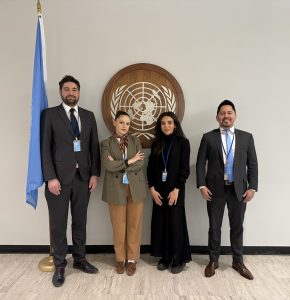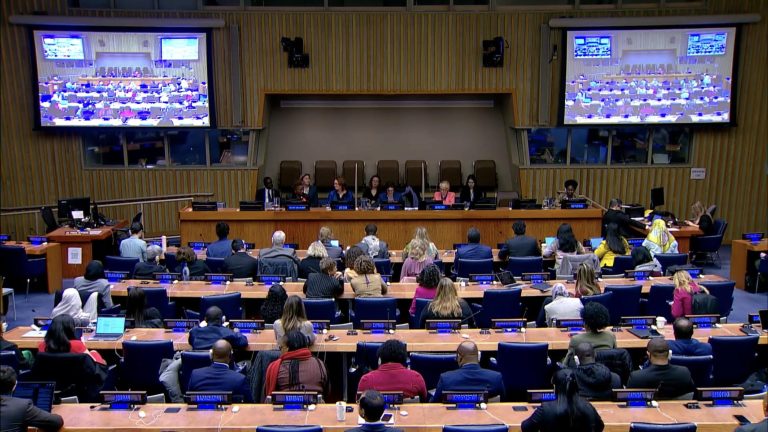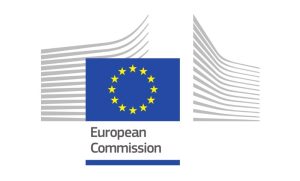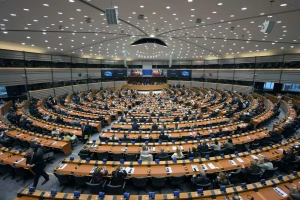“The tradition of respectful negotiations during the Commission faltered alongside the attitudes and demands of certain Member States as well as civil society organizations that wanted to push for ‘rights’ that violate the dignity of the human person as well as the family unit” – Rokaia Elhommosani, WYA Director of Advocacy at CPD58
The WYA Advocacy Team attended the United Nations 58th Session on Population and Development that took place from April 7–11 in New York City. Prepared to stand up for human dignity in the negotiation statements, as well as deliver the official statement on behalf of WYA, the Advocacy Fellows disappointedly witnessed a variety of Member States promoting a series of statements which ultimately led to what is becoming an increasingly common outcome of the CPD: no consensus document.
Though the negotiations to draft an official CPD resolution document were held behind closed doors only before the Commission officially began, throughout the unfolding of discussions during the Commission, the developments were clear to the Fellows. From the first day of the CPD, there was no consensus and no further negotiations or any kind of productive procedure to mitigate the lack of consensus. While the theme of the 58th Session on Population and Development was “[e]nsuring healthy lives and promoting well-being for all at all ages,” it turned out that delivering a clear message on the topic was no easy task.
WYA continues to present a voice of youth standing for human dignity at the UN in this time of rapid, global geopolitical changes and our Advocacy Fellows have been trained in skilled language negotiation as well as informed on international policy discussions. Despite the expectation of a more open exchange of views, the CPD58 exemplified rather disappointing handling of negotiations for the resolution document.
On the last day of the Commission (Friday, April 11), the Chair presented a new version of the outcome document. It didn’t respect the clear red lines indicated by many Member States during the negotiations and contained language that is widely understood to serve promoting abortion as a global right, e.g. “sexual and reproductive health and reproductive rights are central to the realization of social justice.”
The United States delegation was the first to take the floor stating that its concerns have not been met and thus could not join the consensus. The US representative affirmed the United States commitment to the Geneva Consensus Declaration on Promoting Women’s Health and Strengthening the Family. However, he explained that the US Mission’s views were simply not respected on the floor, and ended his statement by formally denouncing the extremism of gender ideology and stating that the US will not reaffirm the UN’s 2030 agenda, or its Sustainable Development Goals.
The Chair reacted immediately after the US intervened, acknowledging that the text does not reflect consensus. Thus, she announced that she would withdraw the proposed document. She then gave room for more Member States to give their remarks, and statements continued.
Burundi took to the floor next and said, “[w]e weren’t able to reach consensus but we remain attached to the dialogue.” Continuing to express regret to the Member States that the fundamental unit of society, family, was completely ignored in the working document. Burundi expressed further reservations on including phrases such as “sexual and reproductive health rights” and “reproductive health.” These phrases can easily be manipulated to imply a right to abortion and further distort the term “gender,” which Burundi sought to include as meaning the two biological sexes. Without compassionate defense of the truth and standing up for human dignity and the authentic development of every person, as WYA’s Declaration on Gender and Human Dignity affirms, the inclusion of these terms cannot be the basis to further include non-consensual terms such as “SOGI” (sexual orientation and gender identity), which would compromise national sovereignty. This was sadly but not surprisingly met by small applause by the Member States.
After countless hours of significant trainings and intense seminars on global policy implementation, such as through the Certified Training Program and the Advocacy Academy, the Advocacy Fellows were ready to speak up for person-first language and strategies, but quickly became disheartened to see the undermining of the necessity to reach consensus. South Africa took the lead of a coalition of Member States and stated that they cannot allow efforts of any Member States to alter the 2030 Sustainable Development Goals, which for them were considered settled obligations.

One Fellow explained that she learned the true intentions of many delegations only on the last day of the CPD58: that they didn’t really look for consensus and would rather see the Commission not adopt the document than address the concerns and opinions of Member States who objected to language that presented a significant step away from the Program of Action that the International Conference on Population and Development adopted in Cairo in 1994.
Similar to the 2025 69th Session of the Commission on the Status of Women (CSW), the UN’s negotiation procedures have been conducted behind closed doors and entirely before the Commission even officially began. These procedures took place only before the official Commission started, without it being accessible to civil society organizations—including WYA—nor was there any public disclosure on the content of the negotiated draft resolution until the end of the Commission. Still, it is important to note that unlike in the CSW, where no information on the outcome document was shared with civil society organizations, the CPD secretariat shared the initial zero draft with NGOs weeks before the Commission. “Today’s discussion brought the disagreements in the positions to public light and attention,” one Fellow said. “This has been a deeply concerning matter since such procedures negatively impact the UN’s transparency commitment and fair conduct. It is questionable if there is any room for such attributes left,” the Fellow continued.
While several delegations, notably France, Sweden, Germany, Denmark, Spain, Mexico and Uruguay, spoke to explain their commitment to the 2030 agenda, and in favor of “sexual and reproductive health and rights,” (France explicitly stated that it considers a right to abortion as part of SRHR), the missions whose views were not reflected in the Chair’s text proposal didn’t keep quiet either. Following the US and Burundi statements, Argentina, Nigeria, Cameroon and others clearly explained their positions and showed how the language in the withdrawn text misrepresents international human rights and the Cairo consensus. The observer Mission of the Holy See stated that, “an inordinate focus on issues related to sexual and reproductive health and reproductive rights has again derailed the process, including disregard for concerns raised by a number of delegations,” reminding the Commission that suggestions that abortion is a part of reproductive health violates the ICPD consensus and domestic and international law.
In conclusion, with yet another CPD with no adopted resolution, our Fellows stand ready to face similar challenges in future commissions to come. There is hope that Member States can make truly successful strides in “[e]nsuring healthy lives and promoting well-being for all at all ages” without infringing upon the intrinsic dignity of the person. Another key takeaway is that the quick reaction from the CPD Chair having withdrawn the text when it became obvious there was no consensus, suggests that the practice of consensual adoption of UN Commission documents is still valued. WYA commends our Advocacy Fellows for their hard work and courage to promote human dignity in all ways for all people.




